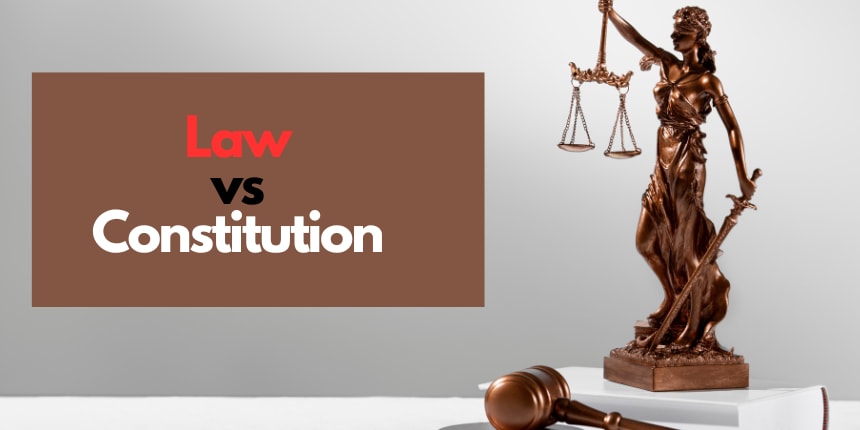Difference Between Law and Constitution - Definition, Scope, Hierarchy
Law and constitution are two fundamental pillars of any legal system. While they are closely related, they serve distinct purposes and have different characteristics. This article aims to delve into the differences between law and constitution, shedding light on their unique roles and functions. Read the article to understand the difference between law and constitution in detail.
This Story also Contains
- What is Constitution?
- What is Law?
- Difference between Constitution and Law: Definition and Scope
- Law Vs Constitution: Hierarchy and Supremacy
- Difference between Law and Constitution: Scope and Flexibility
- Constitution Vs Law: Application and Enforcement

What is Constitution?
A constitution is a fundamental legal document that serves as the foundation of any country's legal system. It establishes the framework for the organization and functioning of the government, outlines the rights and freedoms of citizens, and defines the relationship between the citizens and the state.
The constitution often embodies the principles and values that a society holds dear, providing a set of fundamental rules and guidelines that govern the actions and powers of the government. It is considered as the supreme law of the land, and all other laws and regulations must conform to its provisions. The constitution is designed to ensure a stable and just governance system, protecting individual rights and providing a framework for the rule of law.
Constitution can be written or unwritten. An example of written constitution is Indian Constitution which has 448 articles, 25 parts and 12 schedule. It is also the lengthiest constitution in the world.
An unwritten constitution is based on conventions and traditions established by the society/state over a period of time. The constitution of United Kingdom is often described as an unwritten form of constitution. Even though it is written, but it is not properly codified in one single document and has infact evolved over the time.
Also check - Difference Between LLB and LLM
What is Law?
Law is a system of rules and regulations established by a governing authority to maintain order and harmony within a society. It serves as a framework that defines the rights, duties, and obligations of individuals and organizations, ensuring fairness, justice, and accountability. The purpose of law is to protect the rights and interests of individuals, resolve conflicts, and uphold social order. It encompasses various branches, including criminal law, civil law, constitutional law, and administrative law, each addressing different aspects of legal matters. Law governs all aspects of human interactions, from personal relationships to business transactions, and serves as a guiding principle that ensures equality and promotes a just society.
Browse Law Colleges by Locations:
Difference between Constitution and Law: Definition and Scope
Law: Laws are rules and regulations that govern social behavior and are enforced by a governing authority. They can be enacted by legislative bodies, such as parliaments or congresses, or by judiciary through judicial precedent.
Constitution: A constitution is a supreme legal document that serves as the foundation of a nation's legal system. It establishes the framework for the organization and functioning of the government, sets out the rights and freedoms of citizens, and defines the relationship between citizens and the state.
Law Vs Constitution: Hierarchy and Supremacy
Law: Laws are derived from the authority granted by the constitution or other enabling legislation. They exist in a hierarchical order, where higher laws take precedence over lower ones. For example, a statute can override a regulation issued by an administrative agency.
Constitution: The constitution holds the highest authority in the legal system. All other laws, regulations, and governmental actions must conform to the provisions established by the constitution. If any law is found to be inconsistent with the constitution, it can be declared unconstitutional and invalidated by the judiciary.
Difference between Law and Constitution: Scope and Flexibility
Law: Laws cover a broad range of topics and can vary depending on the jurisdiction, including criminal law, civil law, contract law, tort law, administrative law, and more. They can be enacted, repealed, or amended to accommodate changing societal needs and values.
Constitution: Constitutions tend to provide a framework rather than a detailed set of rules. They aim to set forward enduring principles and fundamental rights without specified application or specificity. Changing the constitution often requires a more elaborate and rigorous process, such as amendment procedures, to ensure stability and constitutional integrity.
Constitution Vs Law: Application and Enforcement
Law: Laws are generally enforced by the executive branch of the government through agencies such as the police and judiciary. Violation of laws can lead to legal consequences, such as fines, imprisonment, or other penalties.
Constitution: While the constitution itself does not enforce its provisions directly, it guides the interpretation and enforceability of laws. Constitutional courts play a vital role in ensuring the adherence to constitutional principles, striking down any legislation that is contrary to the constitution.
Popular Online Law Courses and Certifications:
- Online Law Courses
- Online Cyber Law Courses
- Online Labour Law Courses
- Online Criminal Law Courses
- Online Business Law Courses
In a broader light, law and constitution are interconnected but different aspects of any legal system. While laws regulate daily conduct and are subject to change, the constitution is the fundamental and supreme law that sets the framework for the government and protects basic rights and freedoms. Understanding the differences between law and constitution is essential to comprehend the hierarchy and functioning of legal systems around the world.
Also check - Difference Between Lawyer and Prosecutor
